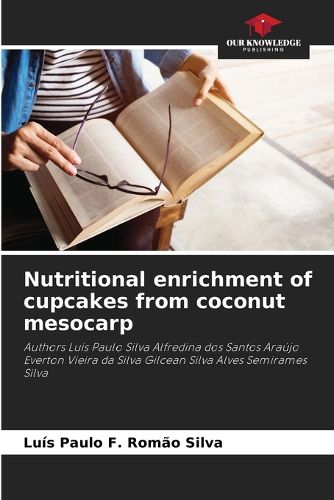Readings Newsletter
Become a Readings Member to make your shopping experience even easier.
Sign in or sign up for free!
You’re not far away from qualifying for FREE standard shipping within Australia
You’ve qualified for FREE standard shipping within Australia
The cart is loading…






The aim of this work was to obtain and characterise coconut mesocarp bran and add it to the nutritional enrichment of cupcakes in different proportions. The cupcakes were made in three different formulations (standard, 1% and 3%). The samples were subjected to physico-chemical analyses of moisture, ash, pH, acidity, protein, lipids, fibre and total soluble sugars. They were also subjected to hygiene and health assessment (coliform at 45 degreesC, coagulase positive staphylococcus, Salmonella sp, moulds and yeasts, Escherichia coli). The sensory analysis was carried out with 146 untrained tasters, samples were presented in individual booths, in a monadic and randomised manner, checking the attributes appearance, colour, flavour, aroma, texture, overall acceptance by the affective method, using the product acceptance test. The cupcake samples showed satisfactory sanitary conditions in relation to the hygiene and health assessment, while in relation to their chemical composition they showed protein (4.90%), lipid (5.93%) and fibre (1.13%) levels, which could make them a food rich in fibre and protein.
$9.00 standard shipping within Australia
FREE standard shipping within Australia for orders over $100.00
Express & International shipping calculated at checkout
The aim of this work was to obtain and characterise coconut mesocarp bran and add it to the nutritional enrichment of cupcakes in different proportions. The cupcakes were made in three different formulations (standard, 1% and 3%). The samples were subjected to physico-chemical analyses of moisture, ash, pH, acidity, protein, lipids, fibre and total soluble sugars. They were also subjected to hygiene and health assessment (coliform at 45 degreesC, coagulase positive staphylococcus, Salmonella sp, moulds and yeasts, Escherichia coli). The sensory analysis was carried out with 146 untrained tasters, samples were presented in individual booths, in a monadic and randomised manner, checking the attributes appearance, colour, flavour, aroma, texture, overall acceptance by the affective method, using the product acceptance test. The cupcake samples showed satisfactory sanitary conditions in relation to the hygiene and health assessment, while in relation to their chemical composition they showed protein (4.90%), lipid (5.93%) and fibre (1.13%) levels, which could make them a food rich in fibre and protein.